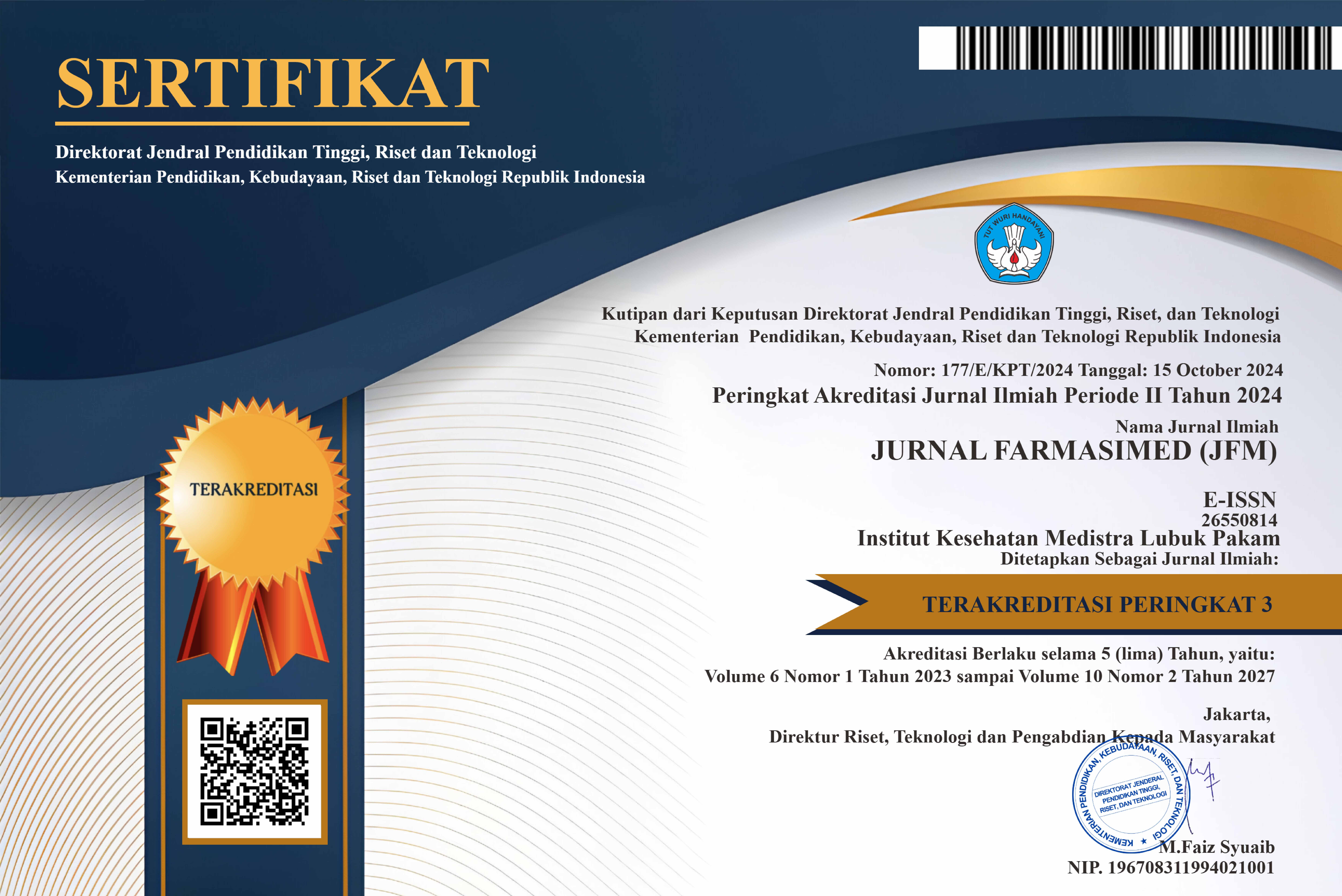ANTIBACTERIAL ACTIVITY TEST OF CELERY LEAF ETHANOL EXTRACT (APIUM GRAVEOLENS L.) AGAINST BACTERIA STREPTOCOCCUS SANGUINIS
Keywords:
Daun seledri, Gingivitis, Streptococcus sanguinisAbstract
Health is a very important part of human life, especially oral health. Diseases that occur due to lack of oral hygiene include gingivitis caused by Streptococcus sanguinis bacteria. Chlorhexidine is a solution that is used to clean the oral cavity and prevent plaque formation on the teeth. An alternative mouthwash that comes from nature is celery leaves (Apium graveolens L.) with secondary metabolites, namely alkaloids, flavonoids, saponins and tannins. This study was conducted to determine the antibacterial activity of celery leaf ethanol extract against Streptococcus sanguinis bacteria at concentrations of 12.5%, 25%, 50% and 100% using the disc diffusion method with chlorhexidine as a positive control and Aquadest as a negative control. The celery leaf extraction method was carried out by maceration method using 96% ethanol solvent. The results of the inhibition test with a concentration of 12.5%, 25%, 50% and 100% celery leaf ethanol extract can inhibit the growth of Streptococcus sanguinis bacteria with an average diameter of the inhibition zone in the negative control group (aquadest) is 0 mm, 12.5% concentration is 8.15 mm, at 25% concentration is 7.95 mm, 50% concentration is 9.05 mm, 100% concentration is 9.9 mm, while in chlorhexidine (positive control) an average of 17.83 mm is obtained. From these results, it can be concluded that there is activity of celery leaf ethanol extract against the growth of Streptococcus sanguinis bacteria with a concentration that effectively inhibits the growth of Streptococcus sanguinis bacteria is 100% concentration.
Keywords: Celery Leaf, Gingivitis, Streptococcus sanguinis
Downloads
References
Anisa (2018) daya antibakteri ekstrak daun seledri (apium graveolens L.) terhadap porphyromonas gingivalis.
Ariana, R. (2016) ‘uji aktivitas antibakteri formulasi sediaan ekstrak etanol daun seledri (Apium graveolens L.) sebagai obat kumur terhadap pertumbuhan bakteri streptococcus mutans.’, in, pp. 1–23.
Attamimi, F.A., Ruslami, R. and Maskoen, A.M. (2017) ‘Uji Aktivitas Antibakteri Ekstrak Kasar Umbi Sarang Semut (Myrmecodia pendens) Dibanding dengan Klorheksidin terhadap Streptococcus sanguinis’, Majalah Kedokteran Bandung, 49(2), pp. 94–101. Available at: https://doi.org/10.15395/mkb.v49n2.1053.
Kondo, S.A., Wibisono, G. and Ciptaningtyas, V.R. (2017) ‘Konsentrasi Terhadap Pertumbuhan Streptococcus Sanguis Penyebab Gingivitis’, Jurnal Kedokteran Diponegoro, 6(1), p. 6.
Lestari, D.S. (2018) ‘Uji Aktivitas Antibakteri Sediaan Hand Sanitizer Ekstrak Seledri (Apium graveolens L) Terhadap Bakteri Staphylococcus aureus’, (1995), pp. 8–28.
Lianah, W., Ayuwardani, N. and Hariningsih, Y. (2021) ‘Aktivitas Antibakteri Ekstrak Etanol Seledri (Apium graveolens L) Terhadap Pertumbuhan Bakteri Actinomyces sp. dan dan Lactobacillus acidophilus’, Duta Pharma Journal, 1(1), pp. 32–39.
Khairani, R. (2022) ‘Uji Aktivitas Antibakteri Ekstrak Etanol Daun Matoa (Pometia pinnata J.R. & G. Forst) Terhadap Staphylococcus aureus Dan Pseudomonas aeruginosa’, Skripsi, (8.5.2017), pp. 2003–2005.
Downloads
Published
Issue
Section
License
Copyright (c) 2023 Chandra Pranata

This work is licensed under a Creative Commons Attribution 4.0 International License.
Copyright in each article is the property of the Author.

























